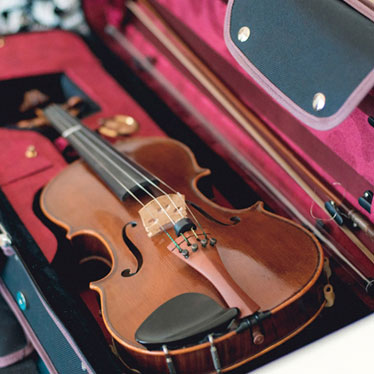Caring For Your Instrument In The Summer

Recently we blogged about how to care for your string instrument during the winter, and now it's time to refresh your memory about instrument care through the summer months.
From providing protection from temperature fluctuations and humidity changes, to advise on how to travel with your instrument, the following are all the tips you need to ensure your instrument weathers (literally) the summer months whole, unscathed, and in great shape to pick up the practice-rehearsal-performance schedule when school starts again.
Replace outdated instrument cases
Are you using a hand-me-down or an ancient case you found at a flea market? While cost-efficiency is a priority, it's important to remember that - after your own attentiveness to its care - the case is your instrument's greatest protection from harm.
One of the best things you can do to care for your instrument this summer is replace an outdated or dilapidated case with one in better condition. Used-but-still-high-quality cases abound both online and at music stores.
Newer, innovative cases do a better job of providing more durable protection, with lighter-weight materials, and with better-designed interiors that make room for all the little extras - like humidification accessories (more on that next). High-tech cases such as the Revelle CrossTECH Violin Case are available for a reasonable price. It's a worthwhile investment of graduation, birthday, and/or holiday money.
Guard your instrument(s) from humidity fluctuations
Your instrument is just like your body - it prefers consistent humidity levels between 40% and 60%. Depending on where you live, summertime humidity levels will rise well above that – and that's no good for your instrument. Wooden instrument and their parts soak up water like a sponge, causing it to swell.
Then, in the presence of drying air conditioning, humidity levels can drop much lower, shrinking those swollen parts. All that swelling and shrinking, moistening and drying leads to a myriad of problems – including cracks, poor sound quality, deterioration, temperamental tuning pegs, wonky bridges, seam separations, mold and mildew issues – and the list goes on.
In addition to keeping and storing string instruments in environments with more stable temperature and humidity levels, we recommend using humidification accessories such as Boveda's 2-Way Humidity Control Kit. These amazing kits store and release moisture, as needed, so your instrument is kept safe from extreme fluctuations. It's a one-size-fits all way to keep humidity consistent.
Keep string instruments stored indoors
We understand that lugging instruments around can be tiresome, but its worth it if it means preserving their integrity. The temptation to leave your instrument in the backseat or the trunk of your car "for convenience" puts it at risk for overheating and for humidity fluctuations that exceed what even the highest-quality Boveda accessories can account for.
Use your body as a gauge; never leave your instrument stored in an environment you wouldn't want to spend countless hours in yourself. Instead, keep it tucked away in a comfortable spot when it's not in use.
Never allow extended exposure to direct sunlight
Perhaps this is an area where you and your string instrument digress. While you may love soaking up the sun, long-term, direct exposure to sunlight is harmful for your string instrument. In addition to making it too hot, and drying it out, sunlight damages the exterior finish, causing it to fade, crack, melt or bubble up – and certain types of finish damage are very difficult to repair.
Use best practices for traveling with your string instrument
Will your string instrument travel with you to summer music camp? Will it accompany you across the country for your traditional visit with Grandma? Instruments are particularly vulnerable to damage, vandalism and/or being misplaced or stolen while en route from point A to point B.
Read our article, How to Travel With Your String Instrument, and learn the best practices for traveling by car or airplane.
Give it extra loving care
If you're currently a music student, your instrument may not be used as often over the summer as it is during the school year. This gives you the chance to give it extra loving care. Clean it regularly to keep it free of dust (summer often creates dryer, dusty environments) and mold spores (common in more humid climates). Give it a good polish to protect it and help it look its best. Summer vacation also provides the time to get it into a music shop for a once-over if it needs to be repaired or adjustments are needed to address minor problems.
If you suspect your instrument sounds "different," like you hear a buzz, rattling sounds, it sounds too tight or too floppy, get it into a music shop or to a luthier for a check-up. This is a sign it could have a weather-related structural issue.
Being proactive on the summer care front yields long-term benefits in terms of reduced instrument repairs and higher-quality sound. After a nice vacation, and a little TLC, you and your string instrument will be ready for the fall flurry.


